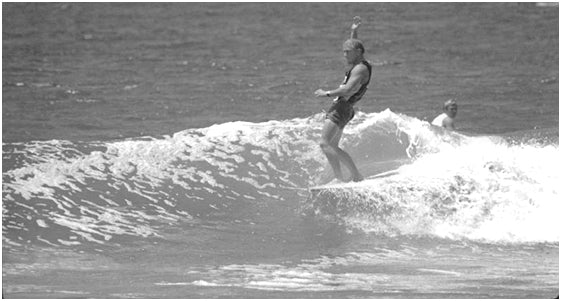Legends: DEWEY WEBER
Dewey Weber Surfboards (1960)
In 1960, Dewey Weber borrowed $1,500 to open his first shop in Venice, California. By the mid-'60s, Weber Surfboards was cranking out 300 boards a week, second only to Hobie Surfboards. But Dewey's contributions to surfing go far beyond mere production numbers...he was so much a part of its soul.
Born David Earl Weber in 1938, Dewey moved with his family from Denver, Colorado to Manhattan Beach, California at age five. By age seven, he had already become a celebrity of sorts; if you're old enough to remember Buster Brown shoes, Dewey was hired to be Buster Brown in the company's national advertising campaign. And if you can remember how popular the yo-yo was, Dewey was a three-time national yo-yo champion, performing on You Bet Your Life--the '50s television program hosted by Groucho Marx. An outstanding wrestler at Mira Costa high school, he was invited to join the U.S. Olympic wrestling team. Unfortunately, an elbow injury kept him from accepting the invitation.
Dewey started surfing at age nine and after graduating from high school in 1956, he headed for Hawaii to ride North Shore waves. Nicknamed "the little man on wheels," the short and athletic Dewey Weber returned to the mainland and became a pioneer to surfing in so many ways. Progressive both in the water and as a businessman, he was credited with originating the term "hotdogging"--a non-traditional style of surfing that included moves like head dips, spinners, fin-first takeoffs and the quasimoto. He was best known for his arched-back noseriding style and huge backside cutbacks.
Dewey was proud of his surfboards and promoted them well. His team of some 30 top-rated international surfers included 1966 World Champion Nat Young, David Nuuhiwa, Mike Tabeling, 1964 women's world surfing champion Phyllis O'Donnell and Joey Hamasaki. Dressed in matching red jackets and trunks he designed himself, the "Red Coats" left no doubt about who was a member of the famous Weber team. Dewey Weber Surfboards popularized the "hatchet" fin and was the first surfboard manufacturer to introduce a removable fin.
Dewey was also first to give his popular designs model designations. Names like "The Performer," "The Stylist," "The Professional" and "The Feather" reflected his huge contribution to surfboard design and are still a part of modern longboarding. The Performer--originally manufactured in 1966 and 1967--sold some 10,000 units and is said to be the best-selling model ever.
Dewey was one of the first to adapt to the late '60s shortboard revolution, but it still took a heavy toll on his business. In 1993--the year Dewey died--Weber Surfboards closed its only remaining shop in Hermosa Beach. Then in 1998, Dewey's sons Shea and Corey revitalized the name, and Weber Surfboards is again a leader in modern surfing. As their father would have wanted, their goal is reflected in the Weber slogan, "Close to the Soul." We at Last Wave Originals agree with the Webers; surfing has a soul--the carefree lifestyle to which we all aspire... Check out the Dewey Weber website at www.deweyweber.com.







